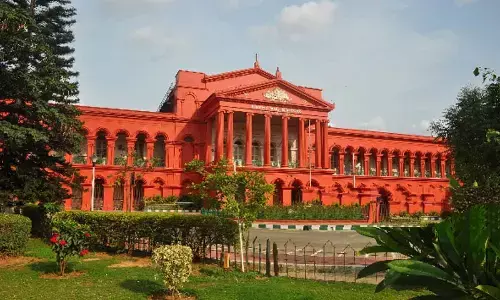What’s The Matter At Hand?

The word ‘matter’ has several connotations, depending on the context. A ‘matter’ of life and death, for example, is used to refer to something of vital or crucial importance.
The word ‘matter’ has several connotations, depending on the context. A ‘matter’ of life and death, for example, is used to refer to something of vital or crucial importance. And ‘a matter of fact’ stands for something which is, in the actual sense, a fact. In a similar manner, the expression ‘the fact of the matter’ is used to introduce a fact into the discus-sion which supports what is being put forth, but is not otherwise widely known. Likewise, in legal parlance, ‘matter’ refers to any situation, issue, or dispute, subject to laws and regulations within the relevant jurisdiction
Inthe 1940s, my father practised as an advocate in what was then known as the High Court of Madras. A post graduate in English literature before he acquired a degree in law, he loved to watch plays and dramas. My first introduction to the word ‘matter’ was when I watched a play called ‘The Forgotten Matter’, staged by a visiting troupe from England, in a popular theater.
With the formation of a new state of Andhra, a new High Court was established in Guntur in that state. Thereafter, following the formation of the Andhra Pradesh state, the Court shifted to Hyderabad, the capital of the new state. Father went wherever the High Court went, and, much like Mary’s Lamb, I was sure to go where father went!
Telugu was the medium of instruction in the school in which I studied in Chennai, in pri-mary school, as also, subsequently, in another school, at Guntur. Half way through the seventh grade, our family moved to Hyderabad, where the school I joined had English as the medium. My ability to speak English was extremely limited; so bad, in fact, that in a birthday party, a friend referred to my English as ‘broken’. It was from that party, in fact, that I first learnt a new phrase – ‘does not matter.’
The widely held belief that the Universe comprised only atoms and light gave way to a new era of realisation and knowledge, with the opening of the case file of ‘anti-matter’, in 1928, by a physicist, Paul Dirac. New developments in scientific research showed that the predominant portion of the Universe comprises ‘dark matter’ and ‘dark energy’, with ‘dark matter’ being what made up most of the mass of galaxies and galaxy clusters. It al-so showed that the elusive dark matter particles could impact human bodies, influencing cell division, blood circulation, and even brain functioning.
Many English words have become a part of the day-to-day lexicon of several Indian lan-guages. Hindi, as a ‘matter’ of fact, has no indigenous substitute for the word minute. Other words, that have seamlessly mingled into the dictionary of Indian languages, in-clude ‘okay’, ‘matter’, ‘tension’, range, and ‘time’, to mention just a few. While this is so also with my mother tongue Telugu, the word ‘matter’, in particular, is the most commonly used, standing, as it does, for ‘subject matter’.
The word ‘matter’ has several other connotations, depending on the context. A ‘matter’ of life and death, for example, is used to refer to something of vital or crucial im-portance. And ‘a matter of fact’ stands for something which is, in the actual sense, a fact. In a similar manner, the expression ‘the fact of the matter’ is used to introduce a fact into the discussion which supports what is being put forth, but is not otherwise widely known. Likewise, in legal parlance, ‘matter’ refers to any situation, issue, or dispute, sub-ject to laws and regulations within the relevant jurisdiction.
A ‘matter of life and death’, similarly, refers to something vital, or of crucial importance, while ‘mincing matters’ describes an attempt to use moderation, or restraint, in language, in order to be polite and avoid being offensive. The phrase ‘for that matter’ is employed by one to emphasise that the point being made is as authentic, or true, as the one previ-ously made. Another such expression ‘no matter’, standing for regardless, or irrespective of.
The tissue in the human brain and spinal cord, which plays a crucial role in allowing normal day-to-day functioning of the body is often referred to as ‘grey matter’, an expres-sion which has come to be synonymous with brains or intellect. Readers fond of yester-year ‘whodunits’ will recall the inimitable Hercule Poirot, the fictional detective of Agatha Christie’s novels, frequently alluding to the need for using ‘the little grey cells’ to solve a crime.
The facility with which the word ‘matter’ lends itself, to varying interpretations, has often resulted in some amusing situations.
I recall how a newspaper column, dealing with financial matters such as the share mar-ket, had the title called ‘Money Matters’, an interesting play on the word ‘matter’, showing how it can stand for different things as a verb, and as a noun!
Human beings often suffer from conditions which are not entirely physiological in nature. Any illness or complaint can be aggravated by the mental factor, such as, for instance, conflict or stress, the consequent feeling being known a ‘psychosomatic’ condition, an extreme manifestation of it being ‘hypochondria’, or a type of anxiety disorder, which makes people worry about their health, even when nothing is seriously wrong.
As an example, of an even more extreme manifestation of that condition, and in a lighter way, I recall having heard of a patient who went to a doctor complaining that he thought he was suffering from hypochondria!
Doctors will tell us that, often, an illness is not physiological, but really in the mind. The ability to control that condition, using the mind alone, is an example of demonstrating the power of ‘mind’ over ‘matter’.
Human beings often suffer from conditions which are not entirely physiological in nature. Any illness or complaint can be aggravated by the mental factor, such as, for instance, conflict or stress, the consequent feeling being known a ‘psychosomatic’ condition, an extreme manifestation of it being ‘hypochondria’, or a type of anxiety disorder, which makes people worry about their health, even when nothing is seriously wrong.
As an example, of an even more extreme manifestation of that condition, and in a lighter way, I recall having heard of a patient who went to a doctor complaining that he thought he was suffering from hypochondria!
With apologies for, once again, ending a piece with a cliché, and in the hope that it will infuse an element of lightheadedness into this otherwise serious theme, I re-peat what I heard a wise guy say the other day:
What is mind? Does not ‘matter’!
What is ‘matter’? Never mind!
(The writer was formerly Chief Secretary, Government of Andhra Pradesh)











